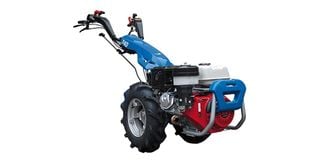Govt should breathe life into two-wheel tractor project

What you need to know:
- Ms Rahima Driwaru, a farmer in Kulikulinga Town Council, says the person operating the tractor went to South Sudan
This week, this publication carried a story highlighting the plight of farmers in the West Nile sub-region who received two-wheel tractors from the government in 2021.
These two-wheel tractors are part of the National Resistance Movement (NRM) government initiative to boost agricultural productivity to enable farmers to cultivate more land, reduce the time spent tilling, and promote commercial farming.
However, the story by this newspaper reveals that the two-wheel tractor initiative across West Nile is facing serious challenges with widespread abandonment of the machines. Many farmers interviewed attributed the challenges to a lack of operational skills, missing parts, and mechanical failures.
Ideally, the two-wheel tractor should come cheaper than other options in the market and should save small-scale farmers more than Shs40,000 per acre in tillage costs. The tractors also make farming, planting, seeding, tilling, fertilising and reaping much faster.
But farmers in West Nile are quickly abandoning the machines and returning to rudimentary ways. So what went wrong?
“We did not use it for long because it broke down after three months. This is why I am now back to using the hoe, which consumes a lot of my energy,” said Ms Grace Adaku.
In Yumbe District, Mr Paul Adiga, the chairperson of Abara Cassava Processing and Marketing Farmers group, said: “We received the tractor for our group with some key parts missing such as the pin. The pin is the part of the tractor that is used to hold the plough and without it, the tractor cannot work.”
Ms Rahima Driwaru, a farmer in Kulikulinga Town Council, says the person operating the tractor went to South Sudan. “Our tractor is not down but it is non-functional in the absence of the operator. During the training, only one person from our group was trained. This is giving us a hard time because some of the group members don’t know how to operate the tractor,” she said.
These are operational problems that should not let the dream of modernising agriculture die just like that. We appeal to the government to review the project in West Nile so that farmers can resume using the tractors.
The issue of spare parts needs to be addressed. These should be made accessible to the intended beneficiaries using a flexible payment method. For instance, there can be a financing mechanism so that suppliers of spare parts can get paid when farmers get their harvests.
Then farmers should be trained on how to use the machines, and most importantly, how to maintain them so that they can last for a while.



